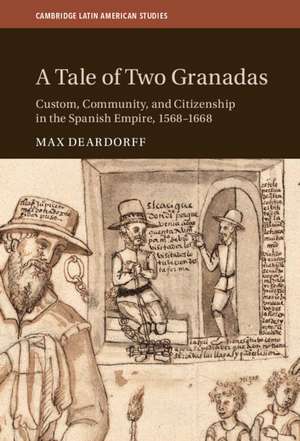A Tale of Two Granadas: Custom, Community, and Citizenship in the Spanish Empire, 1568–1668: Cambridge Latin American Studies, cartea 130
Autor Max Deardorffen Limba Engleză Hardback – 9 aug 2023
Din seria Cambridge Latin American Studies
-
 Preț: 200.79 lei
Preț: 200.79 lei - 9%
 Preț: 593.10 lei
Preț: 593.10 lei -
 Preț: 231.54 lei
Preț: 231.54 lei -
 Preț: 198.38 lei
Preț: 198.38 lei -
 Preț: 236.92 lei
Preț: 236.92 lei -
 Preț: 188.27 lei
Preț: 188.27 lei -
 Preț: 236.99 lei
Preț: 236.99 lei -
 Preț: 322.67 lei
Preț: 322.67 lei -
 Preț: 289.01 lei
Preț: 289.01 lei -
 Preț: 526.45 lei
Preț: 526.45 lei -
 Preț: 209.07 lei
Preț: 209.07 lei - 11%
 Preț: 691.66 lei
Preț: 691.66 lei -
 Preț: 257.52 lei
Preț: 257.52 lei -
 Preț: 290.63 lei
Preț: 290.63 lei -
 Preț: 238.63 lei
Preț: 238.63 lei -
 Preț: 234.31 lei
Preț: 234.31 lei - 9%
 Preț: 594.06 lei
Preț: 594.06 lei -
 Preț: 156.72 lei
Preț: 156.72 lei - 11%
 Preț: 591.79 lei
Preț: 591.79 lei - 14%
 Preț: 732.69 lei
Preț: 732.69 lei -
 Preț: 325.38 lei
Preț: 325.38 lei - 11%
 Preț: 694.91 lei
Preț: 694.91 lei -
 Preț: 328.56 lei
Preț: 328.56 lei -
 Preț: 321.74 lei
Preț: 321.74 lei - 5%
 Preț: 306.74 lei
Preț: 306.74 lei -
 Preț: 287.07 lei
Preț: 287.07 lei -
 Preț: 284.98 lei
Preț: 284.98 lei -
 Preț: 287.66 lei
Preț: 287.66 lei -
 Preț: 284.39 lei
Preț: 284.39 lei -
 Preț: 318.84 lei
Preț: 318.84 lei -
 Preț: 287.28 lei
Preț: 287.28 lei -
 Preț: 191.51 lei
Preț: 191.51 lei -
 Preț: 322.51 lei
Preț: 322.51 lei -
 Preț: 236.72 lei
Preț: 236.72 lei
Preț: 732.87 lei
Preț vechi: 852.17 lei
-14% Nou
Puncte Express: 1099
Preț estimativ în valută:
140.24€ • 149.96$ • 116.92£
140.24€ • 149.96$ • 116.92£
Carte tipărită la comandă
Livrare economică 18 aprilie-02 mai
Preluare comenzi: 021 569.72.76
Specificații
ISBN-13: 9781009335409
ISBN-10: 1009335405
Pagini: 338
Dimensiuni: 237 x 159 x 33 mm
Greutate: 0.74 kg
Editura: Cambridge University Press
Colecția Cambridge University Press
Seria Cambridge Latin American Studies
Locul publicării:New York, United States
ISBN-10: 1009335405
Pagini: 338
Dimensiuni: 237 x 159 x 33 mm
Greutate: 0.74 kg
Editura: Cambridge University Press
Colecția Cambridge University Press
Seria Cambridge Latin American Studies
Locul publicării:New York, United States
Cuprins
List of figures; List of tables; Acknowledgments; Introduction; 1. Iberian antecedents; 2. Politics, reform, and the emergence of Christian citizenship; 3. Moriscos, Arabic Old Christians, and Spanish jurisprudence (1492–1614); 4. Cultivating the Christian republic: the New Kingdom of Granada and the Archbishop Zapata de Cárdenas; 5. Life in the city: the casa poblada and urban citizenship; 6. The roots of the mestizo controversy in the New Kingdom of Granada; 7. The mestizo priesthood; 8. Mestizo officials in the Christian republic; 9. Urban Indians in Santafé and Tunja, 1568–1668; Epilogue; Bibliography; Index.
Recenzii
'Conceptualizing the Spanish empire as a 'Christian Republic', the author highlights mestizos and the social spaces that, by design and/or by struggle, they inhabited in such an empire. The malleability of notions such as subjecthood, race, and 'Repúblicas,' expands our understanding of both mestizos and Spanish colonialism in the Americas.' Alcira Dueñas, The Ohio State University
'Max Deardorff's insightful study reveals that the tensions between religious segregation and assimilation paradoxically informed royal and ecclesiastic policies regarding membership in the Republic of the Spaniards. Deardorff skilfully demonstrates that, by exploiting these tensions, granadinos and neogranadinos of partial or no Spanish/Christian ancestry secured a space within a wider Christian Republic.' José Carlos de la Puente, Texas State University
'In this lucidly written book, Max Deardorff explores what citizenship meant for those social actors in the early modern Spanish territories who faced degrees of exclusion due to their ethnicity and proximity to orthodox Christianity. Meticulously researched and engagingly written, Deardorff brings together the Iberian Atlantic by looking at lesser-studied regions and the people inhabiting their margins, and also, at the Spanish powerholders who moved across the two jurisdictions.' Joanne Rappaport, Georgetown University
'Max Deardorff's insightful study reveals that the tensions between religious segregation and assimilation paradoxically informed royal and ecclesiastic policies regarding membership in the Republic of the Spaniards. Deardorff skilfully demonstrates that, by exploiting these tensions, granadinos and neogranadinos of partial or no Spanish/Christian ancestry secured a space within a wider Christian Republic.' José Carlos de la Puente, Texas State University
'In this lucidly written book, Max Deardorff explores what citizenship meant for those social actors in the early modern Spanish territories who faced degrees of exclusion due to their ethnicity and proximity to orthodox Christianity. Meticulously researched and engagingly written, Deardorff brings together the Iberian Atlantic by looking at lesser-studied regions and the people inhabiting their margins, and also, at the Spanish powerholders who moved across the two jurisdictions.' Joanne Rappaport, Georgetown University
Notă biografică
Descriere
This book examines how race, ethnicity, and religious difference affected the concession of citizenship in the Spanish Empire's territories.
